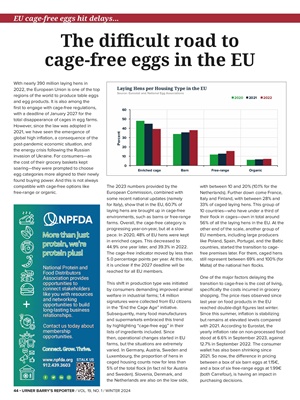
44 • URNER BARRY'S REPORTER / VOL. 19, NO. 1 / WINTER 2024
with between 10 and 20% (10.1% for the
Netherlands). Further down come France,
Italy and Finland, with between 28% and
33% of caged laying hens. This group of
10 countries-who have under a third of
their flock in cages-own in total around
56% of all the laying hens in the EU. At the
other end of the scale, another group of
EU members, including large producers
like Poland, Spain, Portugal, and the Baltic
countries, started the transition to cagefree premises later.
For them, caged hens
still represent between 69% and 100% (for
Malta) of the national hen flocks.
One of the major factors delaying the
transition to cage-free is the cost of living,
specifically the costs incurred in grocery
shopping. The price rises observed since
last year on food products in the EU
reached double-digit figures last winter.
Since this summer, inflation is stabilizing
but remains at elevated levels compared
with 2021. According to Eurostat, the
yearly inflation rate on non-processed food
stood at 6.6% in September 2023, against
12.7% in September 2022. The consumer
wallet has also been shrinking since
2021. So now, the difference in pricing
between a box of six barn eggs at 1.15€,
and a box of six free-range eggs at 1.99€
(both Carrefour), is having an impact in
purchasing decisions.
With nearly 390 million laying hens in
2022, the European Union is one of the top
regions of the world to produce table eggs
and egg products. It is also among the
first to engage with cage-free regulations,
with a deadline of January 2027 for the
total disappearance of cages in egg farms.
However, since the law was adopted in
2021, we have seen the emergence of
global high inflation, a consequence of the
post-pandemic economic situation, and
the energy crisis following the Russian
invasion of Ukraine. For consumers-as
the cost of their grocery baskets kept
soaring-they were prompted to choose
egg categories more aligned to their newly
found buying power. And this is not always
compatible with cage-free options like
free-range or organic.
The 2023 numbers provided by the
European Commission, combined with
some recent national updates (namely
for Italy), show that in the EU, 60.7% of
laying hens are brought up in cage-free
environments, such as barns or free-range
farms. Overall, the cage-free category is
progressing year-on-year, but at a slow
pace. In 2020, 48% of EU hens were kept
in enriched cages. This decreased to
44.9% one year later, and 39.3% in 2022.
The cage-free indicator moved by less than
5.0 percentage points per year. At this rate,
it is unclear if the 2027 deadline will be
reached for all EU members.
This shift in production type was initiated
by consumers demanding improved animal
welfare in industrial farms; 1.4 million
signatures were collected from EU citizens
in the "End the Cage Age" initiative.
Subsequently, many food manufacturers
and supermarkets embraced this trend
by highlighting "cage-free egg" in their
lists of ingredients included. Since
then, operational changes started in EU
farms, but the situations are extremely
varied. In Germany, Austria, Sweden and
Luxembourg, the proportion of hens in
caged housing counts now for less than
5% of the total flock (in fact nil for Austria
and Sweden). Slovenia, Denmark, and
the Netherlands are also on the low side,
EU cage-free eggs hit delays...
The difficult road to
cage-free eggs in the EU
0
10
20
30
40
50
60
Enriched cage Barn Free-range Organic
Percent Laying Hens per Housing Type in the EU
Source: Eurostat and National Egg Associations
2020 2021 2022
STALK USSTALK US
More than just
More than just
protein, we're
protein, we're
protein plus!
protein plus!
Connect. Grow. Thrive.
Connect. Grow. Thrive.
National Protein and
National Protein and
Food Distributors
Food Distributors
Association provides
Association provides
opportunities to
opportunities to
connect stakeholders
connect stakeholders
like you with resources
like you with resources
and networking
and networking
opportunities to build
opportunities to build
long-lasting business
long-lasting business
relationships.
relationships.
Contact us today about
Contact us today about
membership
membership
opportunities.
opportunities.
www.npfda.org
www.npfda.org
912.439.3603
912.439.3603